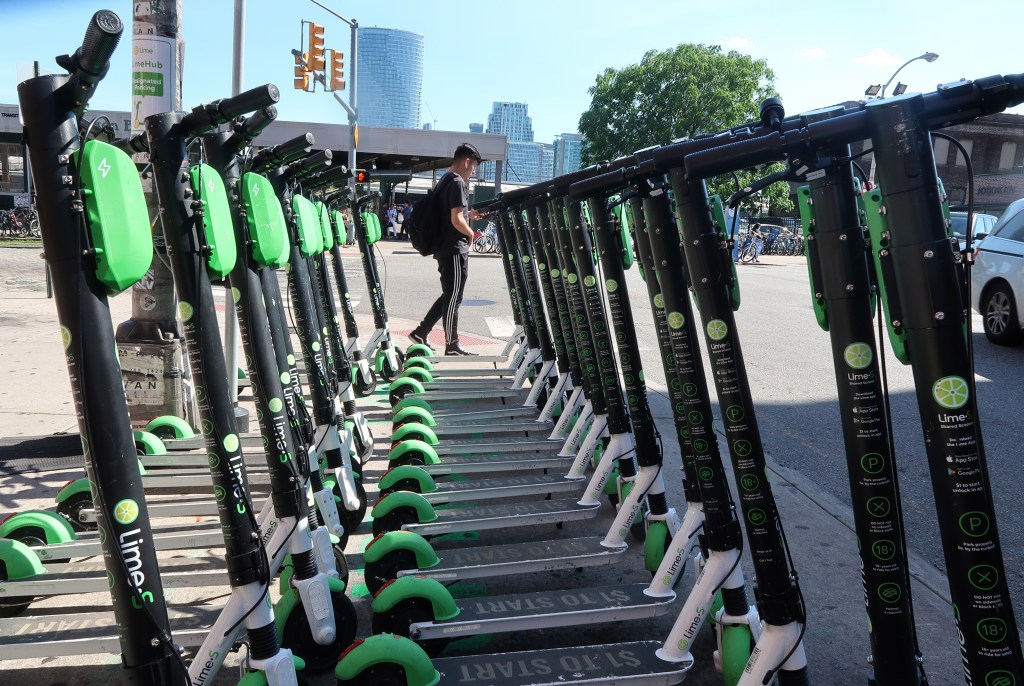Hello and welcome back to our regular morning look at private companies, public markets and the gray space in between.
A million dollars isn’t cool. You know what’s cool? Positive adjusted EBITDA, or something close to it.
That’s the message from scooter unicorn Lime, which announced this week that it was cutting about 14% of its staff and closing a dozen markets. The staff reductions, numbering about 100, come as the company has touted efforts to improve its profitability — going as far as setting targets for when it might reach capital freedom, as well as highlighting the matter in a recent corporate blog post.
(Bird, a Lime competitor, also underwent layoffs this year.)
What’s going on? Unicorns, once hungry for growth, are now hell-bent to show current (and future) investors that their businesses aren’t unprofitable quagmires. Profitability, or movement towards it, is hot, and Lime is a good example of the trend — as is Getaround, which also wrote about its own layoffs this week. Let’s dig in.
Lime’s rapid ascent
Lime’s rise was rapid, and the company had an aggressive capital history. From $50 million raised in a 2017 Series B, Lime raised over $400 million in 2018. The company stacked on over $300 million more in 2019. And as last year came to a close, the company was said to be on the hunt for another enormous check.
Scooters startups come with high cash outlays for hardware, regular expenses for maintenance and recharging costs. It’s an expensive business to get into and a costly one to stay in as losses have proved easy to come by while profits scarce.
This week’s layoffs come in the context of the company likely needing new capital (hence the new fundraise) and its goal of becoming profitable in 2020 — “profitable on an adjusted basis, excluding certain expenses such as taxes,” reported the Wall Street Journal. CNBC said the company was shooting for “EBIT positive” in 2020, citing a spokesperson.
To get there, Lime appears to have found it necessary to not only cut jobs, but close a number of markets. In a post on the matter, here’s Lime itself:
Part of realizing our vision to transform urban mobility is achieving financial independence; that is why we have shifted our primary focus to profitability. While the vast majority of our 120+ markets have adopted micromobility transportation solutions quickly and are profitable, there are select communities throughout the world where micromobility has evolved more slowly. For this reason, we have made the difficult decision to close 12 markets across the globe at this time.
Translating that somewhat, “achieving financial independence” means profits, “profitable” in terms of markets likely means positive contribution on a mostly cash basis, and “evolved more slowly,” means “proved to be a bad place to spend money on deploying a fleet of scooters.”
While layoffs are never good — they impact regular folks, often those with the least ability to find new gigs — it is good to see Lime make intelligent cuts (its worst markets first) to get closer to breakeven, or heavily-adjusted profit.
What sticks out, however, is how the company’s operating leverage appears to been negative for lots of its history. Operating leverage is the measure of how much a company’s profitability rises as revenue grows; the faster that profitability skates higher as revenue expands, the greater a company’s operating leverage is said to be.
Lime and other companies in the unicorn cohort have often show the opposite, posting rising losses in the face of expanding top line. This is what killed WeWork’s IPO hopes. But now, raging against GAAP losses and adjusted deficits, Lime is attacking to both its cost base and market footprint.
It’s not alone in the effort.
The Getaround corollary
Lime’s blog post explaining its layoffs wasn’t the only such post this week from a well-funded startup. Getaround posted one as well.
The company car-sharing startup was last valued at $800 million, post-money. However, news swirled last September that it was looking for $200 million more at a valuation well north of $1 billion. If that round closed, we didn’t hear about it, but we do know that Getaround is trying to wring costs from its operations, moving closer to profitability in the process.
Here’s what the company said this week when its layoffs became known:
In the spirit of “navigating openly”—one of our core values—growing this fast has also pressure-tested our organization. We’ve faced our own set of challenges, leading to less efficient operations and increased costs. Frankly, we’ve learned a lot about our business during this period and the importance of balancing growth with efficiency. SoftBank has stepped up in a big way with their unique network of experts, resources, and partners to support this change.
Implying that growth led to “less efficient operations and increased costs” is a good way of saying that your business wasted a bunch of money chasing revenue that was no good. It’s not a great thing to do, as it indicates you sold shares that you’ll never get back, for revenue that ultimately wasn’t worth it.
Regardless, here is another company that has raised hundreds of millions of dollars (SoftBank is in Getaround) making public noises about layoffs, working to cut costs, and putting together a more reasonable business.
Even more, akin to Lime, Getaround was expected to announce a new round, and hasn’t yet. Each company was said to be in the hunt for hundreds of millions of new dollars towards the end of 2019. Neither has touted the cash. Both are now cutting costs.
Quelle surprise.
Lime is laying off about 100 people and ceasing operations in 12 markets































Comment